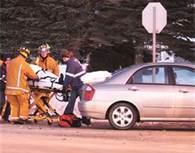Convergence Trends See the Automotive Industry Integrate Health, Wellness and Wellbeing into Vehicles
 |
OEMs draw synergy from the healthcare and allied industries to achieve zero accidents and fatalities, finds Frost & Sullivan
MOUNTAIN VIEW, CA -- June 29, 2015: The automotive industry has long been introducing new and innovative features to cars on the basis of consumer trends, preferences, safety bulletins and market positioning. The industry is now on the verge of integrating health, wellness and wellbeing (HWW) technologies into cars. While automotive HWW non-critical features such as reconfigurable seats and mood lighting are expected to be present in 30 to 40 percent of all cars by 2018, critical functionalities like blood pressure monitoring will penetrate nearly 5 percent of vehicles by 2025.
New analysis from Frost & Sullivan, Executive Outlook of Health, Wellness, and Wellbeing Technologies in the Global Automotive Industry, finds that key global original equipment manufacturers (OEMs) are devising strategies to include built-in, brought-in or cloud-enabled health monitoring systems in cars as standard, optional or advanced features. This will require tie-ups with stakeholders from multiple industries such as healthcare and information technology. The first wave of HWW proliferation in the automotive industry will focus on measuring and monitoring to benefit drivers and passengers through early detection of ailments and assistance in emergencies.
For complimentary access to more information on this research, please visit: Report
The automotive industry aims to achieve its zero-accident, zero-fatality goal using support from synergistic technologies that enable advances in autonomous driving and advanced driver assistance systems.
"With the anticipated shift in the delivery of healthcare services to outside hospitals, smart homes and cars will clearly become new points for measuring, monitoring, basic diagnosing and communicating with individuals about their health," said Frost & Sullivan Automotive & Transportation Industry Analyst Neelam Barua. "Thus, future cars are likely to be designed and reconfigured based on travelers' age and health conditions."
In response to the large aged population of drivers in several societies, automakers are already developing cars that can anticipate a driver's heart attack or sudden disability to bring the vehicle to a safe halt, and alert doctors. Ford and Toyota – among mass-market OEMs – and luxury automakers such as BMW and Audi are the pioneers targeting integration of HWW features into their next-generation products.
"Given the market's nascent stage, the time and effort to build partnerships, engage customers and structure business models to include healthcare elements in the car will be the ultimate determinants of winners and losers," noted Frost & Sullivan Automotive & Transportation Program Manager Vishwas Shankar. "Recognizing this, automakers have begun to build partnerships to grow their strengths and create a diverse ecosystem for healthcare solutions."
However, the HWW space in automotives has its share of initial challenges. Increasing Food and Drug Administration involvement and regulations can dampen innovation and hinder the use of medical devices in vehicles. Further, mixed levels of consumer awareness on automotive HWW technologies as well as privacy and security concerns in the mHealth market will delay the mass rollout of vehicles with these solutions.
On the upside, agencies such as the European New Car Assessment Program are trying to provide assessment services and standardize safety technologies in cars. Their efforts accord higher importance to lifesaving technologies in cars compared to other features and will nurture the emerging HWW market in the global automotive industry.
Executive Outlook of Health, Wellness, and Wellbeing Technologies in the Global Automotive Industry is part of the Automotive & Transportation Growth Partnership Service program. Frost & Sullivan's related studies include: Future of the Global Luxury Vehicle Market, Executive Analysis of the Global Connected Car Market, Global Overview of Truck Video Safety Solutions Market, and Augmented Reality in Cars in North America and the European Union. All studies included in subscriptions provide detailed market opportunities and industry trends evaluated following extensive interviews with market participants.


